Rnsg misc - Study guides, Class notes & Summaries
Looking for the best study guides, study notes and summaries about Rnsg misc? On this page you'll find 79 study documents about Rnsg misc.
Page 3 out of 79 results
Sort by
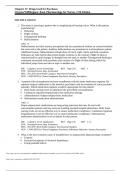
-
Chapter 17: Drugs Used for Psychoses Clayton/Willihnganz: Basic Pharmacology for Nurses, 17th Edition questions with 100% correct answers Download for an A+
- Exam (elaborations) • 7 pages • 2023
- Available in package deal
-
- $8.49
- + learn more
1. The nurse is assessing a patient who is complaining of hearing voices. What is this patient experiencing? a. Delusions b. Flight of ideas c. Disorganized thinking d. Hallucinations ANS: D Hallucinations are false sensory perceptions that are experienced without an external stimulus but seem real to the patient. Auditory hallucinations are prominent in a schizophrenic patient. Additional sensory hallucinations include those of touch, sight, smell, and body sensation. Delusions are fa...
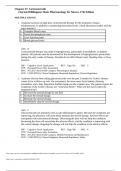
-
Chapter 37: Corticosteroids Clayton/Willihnganz: Basic Pharmacology for Nurses, 17th Edition
- Exam (elaborations) • 8 pages • 2023
-
- $10.49
- + learn more
1. A patient has been on high-dose corticosteroid therapy for the treatment of lupus erythematosus. In addition to monitoring electrolyte levels, which laboratory studies will the nurse monitor? a. Complete blood count b. Partial thromboplastin time c. Liver function panel d. Blood glucose levels ANS: D Corticosteroid therapy may induce hyperglycemia, particularly in prediabetic or diabetic patients. All patients must be monitored for the development of hyperglycemia, particularly duri...
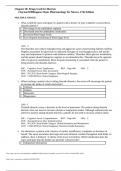
-
Chapter 28: Drugs Used for Diuresis Clayton/Willihnganz: Basic Pharmacology for Nurses, 17th Edition
- Exam (elaborations) • 9 pages • 2023
-
- $9.49
- + learn more
5. How soon will diuresis be expected to occur after the nurse has administered 20 mg of furosemide (Lasix) intravenously (IV) to a patient with heart failure? a. As soon as injected b. Within 10 minutes c. After 2 hours d. After 4 hours ANS: B The onset of diuresis following IV furosemide administration is 5 to 10 minutes after administration. The diuretic effect peaks within 30 minutes and lasts approximately 2 hours. DIF: Cognitive Level: Comprehension REF: Page 436 OBJ: 5 TOP: Nurs...
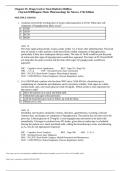
-
Chapter 35: Drugs Used to Treat Diabetes Mellitus Clayton/Willihnganz: Basic Pharmacology for Nurses, 17th Edition
- Exam (elaborations) • 9 pages • 2023
-
- $9.49
- + learn more
MULTIPLE CHOICE 1. A patient received the evening dose of Lispro subcutaneously at 16:30. What time will symptoms of hypoglycemia likely occur? a. 19:00 b. 18:30 c. 01:30 d. 06:00 ANS: B The most rapid-acting insulin, Lispro, peaks within 1 to 2 hours after administration. The peak time of insulin is when patients would most likely exhibit symptoms of hypoglycemia, particularly if they have inadequate dietary intake. The time of 19:00 would be past the peak of action and after signs o...
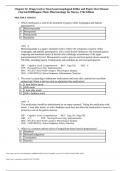
-
Chapter 32: Drugs Used to Treat Gastroesophageal Reflux and Peptic Ulcer Disease Clayton/Willihnganz: Basic Pharmacology for Nurses, 17th Edition
- Exam (elaborations) • 9 pages • 2023
- Available in package deal
-
- $8.49
- + learn more
1. Which medication is used in the treatment of gastric reflux esophagitis and diabetic gastroparesis? a. Metoclopramide b. Misoprostol c. Pantoprazole d. Ranitidine ANS: A Metoclopramide is a gastric stimulant used to relieve the symptoms of gastric reflux esophagitis and diabetic gastroparesis, aid in small bowel intubation, and stimulate gastric emptying and intestinal transit of barium after radiologic examination of the upper gastrointestinal (GI) tract. Misoprostol is used to pre...
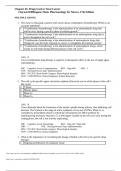
-
Chapter 43: Drugs Used to Treat Cancer Clayton/Willihnganz: Basic Pharmacology for Nurses, 17th Edition
- Exam (elaborations) • 8 pages • 2023
-
- $10.49
- + learn more
1. The nurse is educating a patient with cancer about combination chemotherapy. Which is an accurate statement? a. “Combination chemotherapy is the administration of an antineoplastic drug that will be toxic during a specific phase of cellular growth.” b. “Combination chemotherapy is the administration of an antineoplastic drug that is active throughout the cell cycle.” c. “Combination chemotherapy is the administration of antineoplastic drugs that change the way the body respon...
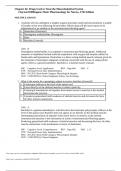
-
Chapter 44: Drugs Used to Treat the Musculoskeletal System Clayton/Willihnganz: Basic Pharmacology for Nurses, 17th Edition
- Exam (elaborations) • 8 pages • 2023
-
- $9.49
- + learn more
1. A patient who has undergone a lengthy surgical procedure under general anesthesia is unable to breathe on his own following the procedure. Which drug will the nurse expect to be administered as an antidote to the neuromuscular-blocking agent? a. Dantrolene (Dantrium) b. Neostigmine methylsulfate (Prostigmin) c. Ether d. Baclofen (Lioresal) ANS: B Neostigmine methylsulfate is an antidote to neuromuscular-blocking agents. Additional measures to implement include artificial respirations...
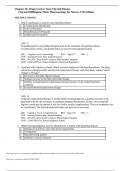
-
Chapter 36: Drugs Used to Treat Thyroid Disease Clayton/Willihnganz: Basic Pharmacology for Nurses, 17th Edition
- Exam (elaborations) • 8 pages • 2023
-
- $9.49
- + learn more
2. A patient with a history of heart failure has been diagnosed with hypothyroidism. The drug interaction with glycosides and thyroid replacement therapy will most likely require which change in therapy? a. Decrease in the daily digoxin dosage b. Gradual increase in the daily glycoside dosage c. Inability to begin thyroid replacement therapy because of the underlying heart condition d. Increased thyroid replacement dosage ANS: B If thyroid replacement therapy is started while receiving ...
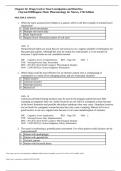
-
Chapter 34: Drugs Used to Treat Constipation and Diarrhea Clayton/Willihnganz: Basic Pharmacology for Nurses, 17th Edition
- Exam (elaborations) • 9 pages • 2023
-
- $9.49
- + learn more
1. When the nurse assesses bowel habits in a patient, which is the best example of normal bowel elimination? a. Daily bowel movements b. Multiple soft stools daily c. Daily liquid stools d. Regular bowel elimination pattern of soft stool ANS: D Normal bowel habits are stools that are soft and occur on a regular schedule of elimination for that particular patient. Although this may be routine for some people, it is not normal for everyone. Liquid stools are not considered normal. DIF: C...
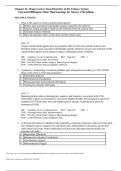
-
Chapter 41: Drugs Used to Treat Disorders of the Urinary System Clayton/Willihnganz: Basic Pharmacology for Nurses, 17th Edition
- Exam (elaborations) • 8 pages • 2023
-
- $9.49
- + learn more
1. What is the action of urinary antimicrobial agents? a. Reduce pain associated with bladder spasms caused by the infection b. Enhance output enough to flush out the infection from the urinary tract c. Eliminate urinary retention d. Have an antiseptic effect on the urine and the urinary tract ANS: D Urinary antimicrobial agents have an antiseptic effect on the urine and the urinary tract. Pyridium reduces pain associated with bladder spasms related to urinary tract infection (UTI). Anti...

How much did you already spend on Stuvia? Imagine there are plenty more of you out there paying for study notes, but this time YOU are the seller. Ka-ching! Discover all about earning on Stuvia


